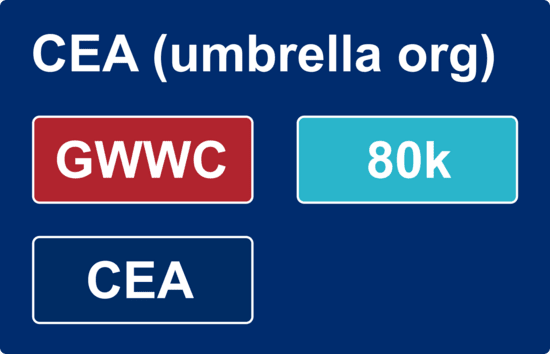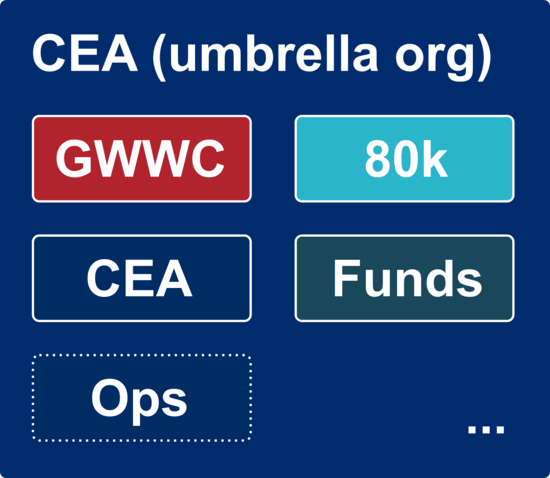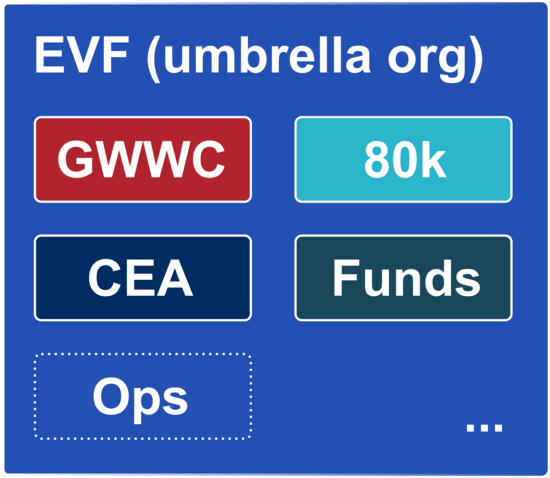In 2011 effective altruists in Oxford had two main organizations: Giving What We Can and 80,000 Hours. They wanted to incorporate, and created the Centre for Effective Altruism as an umbrella organization to host them: [1]
Over time they started running other projects: conferences, supporting local groups, the EA forum, community health, etc. There was effectively a "CEA" community-focused organization within the "CEA" umbrella organization:
This was pretty confusing: when someone said "CEA" did they mean the organization focused on the EA community ("CEA runs EA Global") or the umbrella organization ("80k is part of CEA")? This got even more confusing as there started to be more organizations and projects:
In September 2022 the umbrella organization renamed itself to the Effective Ventures Foundation:
Unfortunately the announcement wasn't very clear about what specifically was changing, and a lot of people are still confused about when to say "CEA" and when to say "EV". Hopefully this history and the diagrams clear things up a bit!
[EDIT: changed 'EVF' to 'EV'; Shakeel says they prefer the latter.]
[1] This is also the origin of using effective altruism to refer to the movement.





Most of this makes sense thanks.
I don't love the name "Effective Ventures Foundation" though. My initial reaction is that it's not terrible but not great either. It feels more like a business, or even a specific philanthropy. I'm also not sure it describes well what effective altruism is about (as much as you can describe anything in a name).
Maybe it's just me though? I wonder what others' thoughts are behind the name, and how it was chosen?
I would guess this is at least somewhat intentional, my guess is that some of the orgs under EV (most obviously CEA) want to identify with effective altruism, while others think the brand is too costly for them.
My best guess is that the name "Effective Ventures Foundation" would not have been chosen as the new name of CEA if they had not gotten the ev.org domain. Though I think the new name (and the absence of the "A") correspond to a gradual change in EA culture in recent years. One can call it sign neglect.
This is clarifying in the sense of "what is the internal structure of this organisation, and how did it come to be".
But I don't think it's relevant to most people's arguments/discussions/complaints regarding any of these "orgs". The reason is that there is just one org. Just one board making decisions. Any discussion of 80k is a discussion of EVF. Any complaint about CEA is a complaint about EVF. They're all interchangable in such contexts. "EVF bought Wytham Abbey" is the same thing as "CEA bought Wytham Abbey", because a literal interpretation of the latter is nonsensical, as CEA is not an actual organisation.
There are pros and cons to insisting on the "proper" names for these entities - on the one hand, preventing confusion; on the other hand, preventing the continuity of criticism aimed at them, and risking that new people who join thus have a hard time finding out about existing criticism.
They're not effectively one org. While the trustees of EVF are responsible for everything that happens under their umbrella, the people running each of the orgs have an amount of independence more similar to a CEO than a department head.
A useful model is something like:
This means that if you disapprove of something 80k does it makes sense to consider that when evaluating Howie and team, and, if it's sufficiently serious, the EVF trustees. Or, in response to your specific issue, if you think the Wytham Abbey purchase was a bad use of funds and staff time you could hold it against Owen for driving it, the other EVF trustees for agreeing to take it under their umbrella, and Open Phil for funding it. But downgrading your estimate of CEA's leadership (Max and team) or the other EVF-hosted projects (80k, GWWC, Funds, ...) makes much less sense.
"Org under umbrella did thing" is not nonsensical: it gives you information about who made the decision and what you can expect from that (sub)org in the future.
It's pretty weird that the charity page has been edited since this comment to hide the board members. I'd like to see reflexive transparency, not reflexive hiding of information.
https://ev.org/charity/
https://web.archive.org/web/20221221123432/https://ev.org/charity/
Hi — this was removed accidentally while updating other text on the page. We'll put it back ASAP (might take a few days though because of timezones/people being on holiday, and I don't have access to edit that page).
Thanks for drawing our attention to this and calling us out for it — we definitely appreciate it (and, at the meta-level, I'm very glad we have a community that pushes us on things like this).
Removed accidentally? I don't know much about web dev, but how do you accidentally edit a website and accidentally delete a specific paragraph?
It does seem plausible that it was a miscommunication actually, the original was:
(crossed out is the intentionally removed bit) And the new is
I'd guess someone handed someone who was rushing and not paying attention the task of removing the sentence about Effective Ventures in the middle of the last paragraph, and it got misunderstood as removing both that and the middle paragraph. Delegation is pretty failure prone.
I'm also quite keen to assume good faith, and would prefer that central EA nodes didn't feel like they have to focus undue effort and brain-cycles on watching their backs, and were free to optimize more important things.
Still seems to be at https://ev.org/ops/about/ but that's a weirder place for it
I'm wondering how the Wytham Abbey purchase isn't related to the CEA (and the other umbrella orgs), when it seems likely that the events that will be held there will be ran by the CEA? Or am I wrong about that? What would EVF be purchasing that place for, if not for the CEA (and the other umbrella orgs)? (Genuine question)
We should get confirmation from people actually involved in this, but my interpretation was that this is going to be a new project/org under EV. The kinds of events that Owen talks about wanting to buy it to host (residential academicy workshops in specialist areas) are pretty different from what CEA normally runs (larger events targeted at the EA community).
I do find Owen's perspective on being public about things [1] very different from mine, though, and I wish the team would say more publicly about what they're planning to do. I also think it would be good for this to be listed, even in tentative form, on the EV orgs page so we can see how it fits in.
[1] "I'm not a fan of trying to create hype. I thought the natural time to post about the project publicly would be when we were ready to accept public applications to run events, and it felt a bit gauche to post before that." (link)
Oh, I didn't know that was (possibly) in the works. I think if they made that public it would maybe clear up the associations being made between the other umbrella orgs and this purchase. Thanks!
This is now confirmed:
"EVF currently operates the following discrete 'projects' (colloquially known as orgs): CEA, 80,000 Hours, ... Wytham Abbey, ..."
I generally disagree with how you think about this - the main thing is "who is accountable?", and the answer to this is the same for all sub-orgs.
Still, I do agree with this part:
Accountable to whom, though? The board is ultimately legally accountable (for things like whether or not the entity is fulfilling its charitable purposes), but this is a pretty weak kind of accountability in most cases.
I'd guess that suborg leadership is probably more accountable to funders, for example.
(My actual position here is intermediate between yours & Jeff's.)
According to the website, EV provides these services:
I would consider all of these things to be ultimately the responsibility of the CEO in an ordinary organisation.
Typical sphere of responsibility, yes, but I don't think offloading most of those to the EV Ops team diminishes independence, in terms of each org head deciding what their org does?
It's also not that clear what the divisions look like: for example, I'm pretty sure the orgs make their own decisions on who to hire, so my guess is the "hiring" under EV Ops is more the mechanics of implementing hiring decisions?
I think that offloading these sorts of things does meaningfully diminish independence, even if it doesn't entirely abrogate it. IME the kinds of decisions & policies included in the list Larks quotes have a quite profound effect on the character of an organisation.
I think these are typically ultimately the responsibility of the sponsee org CEOs. I see them as generally entering this agreement, in a way where they are effectively deciding to use the sponsor for operations support.
Sponsees typically have the option of leaving the sponsored org, and I think that makes a big difference.
It's similar to an org that's outsourced much of it's product to a white-label organization.
All that said, there's definitely a spectrum here. It's definitely possible that a big org could control and manage sub-orgs within a sponsee/sponsored relationship. I think much of the devil is in the details.
I think it would be useful for people at CEA to help clarify this. Who ultimately is in charge of each project? I assume it's typically that project's CEO, but perhaps not in all cases.
A related question is who is in charge of firing the CEO. If it is the case that the CEF board is the one responsible, then it could be seen as much more of the CEF's direct responsibility.
On some more thinking about it, I'm actually curious who has authority to remove/replace the CEOs. I think that's the key question to me.
The EVF trustees, no? Ex: https://www.centreforeffectivealtruism.org/blog/announcing-a-change-of-leadership-at-cea
That's a serious red flag to me. I feel like EA orgs should be seeking to have less coupling rather than more. The fact that five people - one of whom has seemingly no interaction with the community, and who we know almost nothing about - are the de facto rulers of almost the whole EA movement seems extremely unhealthy for its future.
Interestingly, I have roughly the opposite concern. I'm worried that the current structure of EVF results in too little accountability for individual projects under EV's umbrella.
Formally, the board is accountable for the actions of an org it "runs". But the great majority of actual decisions are made by the executive officers, especially the CEO/ED. In the case when the board is responsible for a dozen or more autonomous suborgs, their ultimate responsibility/accountability seems likely to be even more nominal than usual.
I expect that, in practice, EVF suborg leaders have significantly less oversight & accountability than they would if they all had separate boards. (I also have concerns about how this structure might reduce accountability to the community/public, but these are currently too ill-formed to express very clearly.)
In practice though, your concerns seem to point to the same conclusion, don't they? That different sub-orgs should be separate from each other and have mostly-disjoint boards?
Plausibly.
I'm not sure how much we should be relying on the legal institution of the nonprofit board here, since these are often pretty toothless. (Honestly, CEA's board has shown more teeth than many ever do, though they were still very slow to act in this case IMO.)
But I'm also not sure what the alternative is.
(My comment on this other thread is also somewhat relevant here.)
If the organisations are effectively run individually, then they answer to their funders.
If they all get funding directed from the same group who just de facto fund whatever falls under the EV umbrella, then we're back to the EV trustees having all the power.
If they get substantial funding from we, the movement, that seems healthier, but only if there's some kind of meaningful competition. That only seems possible if they limit their scope to allow for meaningful comparisons between orgs - which I argued for here, though didn't get much engagement :\
I'm not actually sure these are different concerns - it depends how the logistics work. If the rulership method of the EV trustees is 'appoint someone, then direct funding to them', then that's still a lot of influence. If it's 'appoint someone, then let them find their own funding', it's quite a lot less so (though those waters could be muddied by funders being implicitly influenced to give funding to anyone under the EV umbrella).
It's my loose impression that different EVF orgs do need to seek their own funding, at least for stuff that doesn't fall under EV Ops' purview (though the latter is not inconsiderable!). I'm not sure I've ever seen this laid out explicitly, though, and agree that would help.
Seems right to me, at least directionally.
This comment seems crazy to me. These people have legal accountability for the organization EVF. They are not "de facto rules of almost the whole EA movement". Can you actually propose a scenario in which these people exert much if any influence, apart from getting to fire the leadership of EVF, which is at most a modestly big deal anyway?
They also get to hire the leadership of EVF. Those people then work in the knowledge that they can theoretically be fired by the trustees, giving the trustees all the soft power that that implies. They may not currently wield it, but wielding and having power are two different things. Similarly, it may not be a net positive to their lives (I suspect it isn't for most of them), but someone not benefiting from power doesn't mean they don't have it.
Asserting it's 'at most a modestly big deal' in such an incredulous tone seems counterproductive when that's a large part of the point in discussion.
I think it's a bit weird to call this "soft" power? It's quite explicit power: the trustees/boards have final responsibility for their organizations, including all the projects under them.
'Soft influence' then, if they have a hands-off approach? Either way, it seems concerning.
I'm assuming you're talking about Tasha McCauley? I'm also confused by this: I had thought this was CEA's former (2017-2018) CEO with a similar name.
Looks like she's CEO of GeoSim and an OpenAI board member. I also found a recording of a panel appearance at EAG 2017.
Yeah. I got that far, but her otherwise total nonengagement with/visibility to a community she has so much control over seems worrying, no?
I wonder if the low visibility is that she's married to a celebrity and so has pretty different privacy tradeoffs than most of us?
That seems plausible, but raises the question of why someone who needs to maintain such a high level of privacy is a suitable leader of a movement which should be as committed to transparency as possible.
Even among EAs I'm atypically pro-transparency, but while I would worry if there was little public information or community engagement from most of the board members that's far from the case. If you overly constrain the board members you're willing to have you can miss out on people with skills or experience that would be really valuable for the organization.
I'm not suggesting she do a five-page interview in Time Magazine - just some kind of engagement with the community she's somehow, virtually without its knowledge, become custodian of. Like, an occasional forum post, monthly office hours, or similar.
Part of the problem with the current structure is precisely that no-one gets to ask the question 'how qualified are the Watchmen?' - we just have to take it on the trust of the other four, which compounds the problem. By comparison, how would you feel if two, three, or four of the remaining five were replaced by someone equally as mysterious? I think each unknown makes the concerns about concentration of influence and lack of accountability look proportionately worse.
BTW I agree with the sentiment that the EA movement would benefit from knowing a little more about McCauley. Even just some very basic questions like:
I think it's a relatively small issue, but not knowing much about the EVF board seems like it somewhat reduces the abilities of EAs to properly calibrate their views on how much to trust/rely on EVF and its subsidiaries.
I will also say that it doesn't feel super representative of the EA community that all 5 of EVF's board members appear to primarily be longtermists. This isn't necessarily an issue if all the board members are doing a good job of listening to and representing the views of the EA community, rather than just their own. But it's sort of odd.
Thanks Jeff - this is helpful!
I don't know who would be best placed to do this, but I can imagine it would be really helpful to have more expansive versions of these diagrams. Especially ones that make the specific nature of the relationships between orgs clear (i.e. going beyond fiscal sponsorship) . A lot of the comments/discussion on this post seem to be about speculation about the specific nature of these relationships.
Here is what I imagined:
I suspect doing something like this would end up being pretty subjective, it would change over time, and there will be disagreement between people involved. e.g. things like "strength of strategic oversight" are going to be pretty ambiguous. But the value in attempts at creating some common knowledge here seems high given the current level of confusion.
(and alongside increasing trustworthiness, this kind of transparency would also be valuable for people setting up new orgs in the ecosystem. Currently, if you want to figure out how your org can/should fit in you have to try and build a picture like the above yourself)
I am curious whether CEA and other individual organisations have their own de jure or de facto boards right now. I can't find a specific board for CEA on CEA's website except EVF's board being listed. 80000 Hours claims to have its own president and trustees but I'm not sure whether that's legally possible.
Each of the "children" of EVF are all legally part of EVF, and so share the same trustees.
CEA seems to have, or have had, an "advisory panel": https://www.centreforeffectivealtruism.org/blog/advisory-panel-at-cea
A long time ago I was on an "advisory board" for 80k; not sure if they still have one: https://80000hours.org/2014/06/advisory-board-report-june-2014/
Not quite the same question but I believe ACE started as one of the CEA children but is a separate entity now.
"Animal Charity Evaluators began in 2012 under the name Effective Animal Activism (EAA), as a division of the U.K.-based charity 80,000 Hours ... In 2013, EAA underwent significant changes. Although our original focus was on creating discussion about tactics to help animals, this shifted towards an emphasis on creating quality educational and research content. EAA hired our first Executive Director Jon Bockman and merged with his charity, Justice for Animals, thereby officially becoming a 501(c)(3) nonprofit. Our mission was revised to specify the goal of finding and promoting highly effective opportunities for helping animals, and we rebranded as Animal Charity Evaluators"
https://animalcharityevaluators.org/about/background/our-history
One clarification on this: CEA, 80,000 Hours etc. are all projects of the Effective Ventures group — which is the umbrella term for EVF (a UK registered charity) and CEA USA Inc. (a US registered charity), two separate legal entities which work together.
Thanks! I had thought CEA USA was in the process of being renamed to EVF USA?
What is the acronym you would like to see for the umbrella organization? "EVF", "EVG", "EV"? I'm happy to edit my diagrams if EVF is not the preferred acronym.
Yeah that was in process but I'm not sure what the timeline on it is. We generally use "EV" to refer to the thing your diagrams are pointing to, though EV is not an organisation in itself — just an umbrella term for the two distinct entities. Thanks!
Would redoing the diagrams and text with "EV" instead of "EVF" be better?
(Personally I like "EVF" better, mostly because three-letter acronyms have fewer conflicts, but if the umbrella org wants to go by "EV" I'm happy to help)
Yeah that’d be great. Thanks!
edited!
I'm confused: Announcing Interim CEOs of EVF consistently uses "EVF", including in phrases like "80k, one of the largest EVF projects". Should I switch these diagrams back to say "EVF"?
(I raised this when the other post came out, but no response.)
Who formally employs the staff of these projects, though?
The projects aren't legal entities and so can't employ people, so it sounds like EVF US or EVF UK, depending on where the staff member lives?
My understanding was that at at least one point, GWWC and 80k became entirely separate legal entities - though maybe they rejoined the umbrella later?
That's not something I've heard before; do you know where you heard that?
No, sorry. I'd at some stage developed the sense that it was common knowledge, so presumably it was a handful of different interactions.